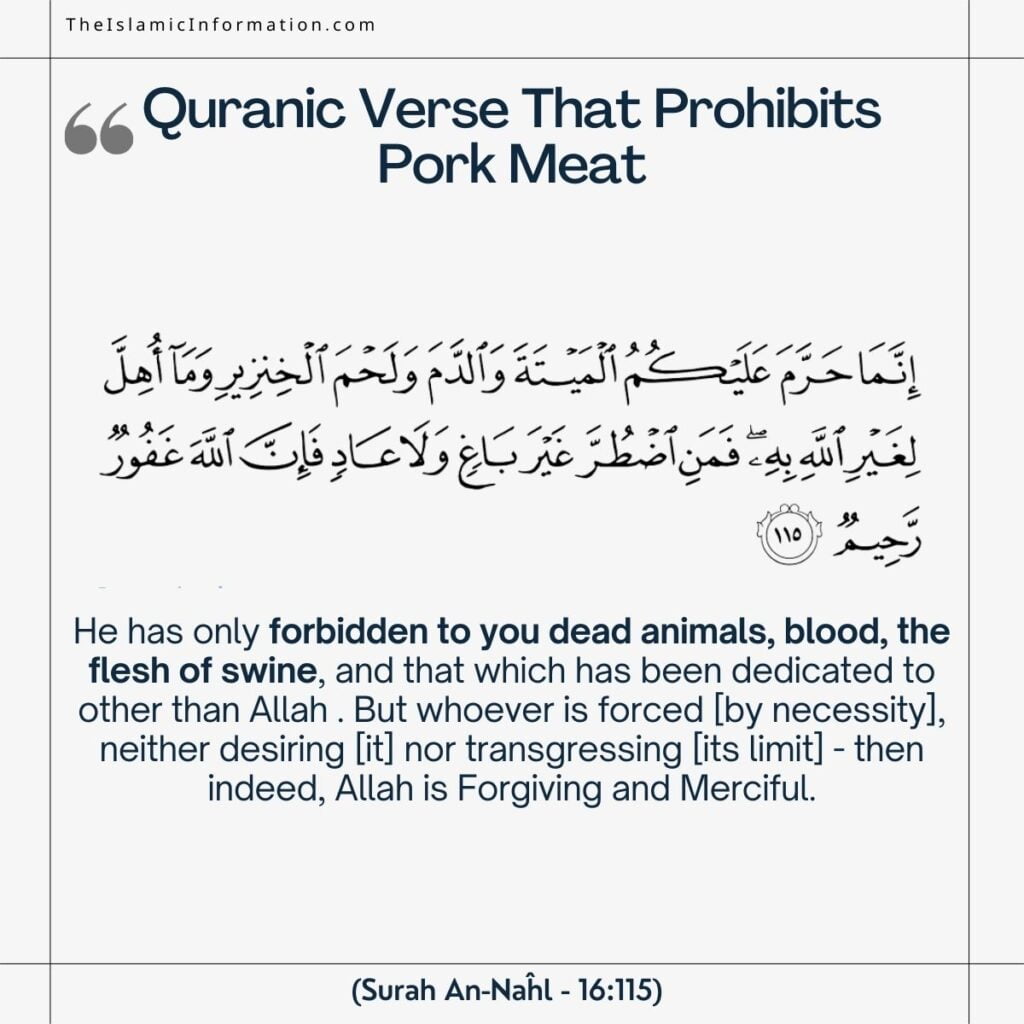Many Non-Muslims often ask, “why do Muslims not eat pork” or “why can’t Muslims eat pork” and ask the reasons behind its prohibition in Islam. And why the Pig is labeled as the worse animal in Islam.
Table of Contents
These questions are very relevant and should be answered. Today we will tell you 12 facts about how horrible eating Pork meat is to your health.
Why pork is Haram (Prohibited) in Islam?
- Pork meat is considered impure and unclean in Islam, and its consumption is prohibited as per Quran and Hadith.
- Eating pork meat introduces many diseases to humans, and these diseases can easily be transmitted to other human beings.
- Pigs can digest and eat anything, including feces, which can make your body get prone to more diseases and infections.
- According to the Islamic beliefs, eating pork meat can demage your spritualtiy as it is considered impure.
- Islam put highest emphasis on cleanliness and purity, as it is considered half deen in Islam. And consumption of something impure breaks that cleanliness rule.
Quranic verses that prohibits eating pork


Hadiths that prohibits eating pork

Health dangers of eating pork
Here are the 12 majors dangers of eating pork meat;
1. Trichinosis
Source: Centers for Disease Control and Prevention
Trichinella spiralis is a parasitic infection caused by the roundworm. It is transmitted through the consumption of undercooked or raw pork containing the parasite.
Stomach pain, diarrhoea, fever, and muscle pain are among the symptoms. In severe cases, it may result in heart failure or respiratory failure.
2. Food poisoning
Source: Food Safety and Inspection Service
Salmonella, E. coli, and Listeria are just a few of the bacteria that can contaminate pork and cause food poisoning in humans. Diarrhea, vomiting, fever, and cramps in the abdomen are all symptoms.
3. Hepatitis E
Source: World Health Organization
The hepatitis E virus, which is the cause of the liver disease that can be contracted by eating raw or undercooked pork, can also be found in pork. Fever, fatigue, and jaundice are symptoms.
4. Antibiotic resistance
Source: World Health Organization
Antibiotic-resistant bacteria may emerge as a result of the use of antibiotics in the production of pigs, which may then be transmitted to people who eat pork products. This may make using antibiotics to treat infections more challenging.
5. High in saturated fat
Source: American Heart Association
Saturated fat, which is abundant in pork, raises the risk of heart disease and other illnesses.
6. High in cholesterol
Source: American Heart Association
Additionally, pork contains a lot of cholesterol, which increases the risk of heart disease.
7. Causes cancer
Source: National Cancer Institute
Sodium nitrate, which has been connected to an increased risk of some types of cancer, is present in some pork products like bacon and ham.
8. Processing
Source: World Cancer Research Fund International
The high processing levels of many pork products can raise the risk of many diseases, including cancer and heart disease.
9. Inflammatory bowel disease
Source: Journal of Crohn's and Colitis
The risk of inflammatory bowel disorders like Crohn’s disease and ulcerative colitis may rise if you eat pork.
10. Increased mortality
Source: BMC Medicine
According to a study, regular consumption of pork was linked to a higher risk of death, particularly from cancer and cardiovascular disease.
11. Swine flu
Source: Centers for Disease Control and Prevention (CDC)
Pork that has been undercooked or eaten raw can expose humans to the swine flu virus that is present in pigs. Fever, coughing, and respiratory issues are symptoms.
12. Tapeworms
Source: World Health Organization
Tapeworm infections in pork can lead to taeniasis, a disease that affects humans. Nausea, diarrhoea, abdominal pain, and weight loss are symptoms. In extreme circumstances, tapeworms can harm vital organs like the liver, lungs, and brain.
Bottom line
So, now you have an idea why ISLAM has completely prohibited the use of Pork for all Muslims. The facts stated above are scientifically proven. Do share this knowledge with your friends and family.




 WhatsApp Channel
WhatsApp Channel
 Instagram
Instagram
 Facebook
Facebook
 X (Twitter)
X (Twitter)
If this is correct, then it is obvious why the early people didn’t eat pork… They had the wisdom not to!
Well I guess Billions or Chinese and most folks in the US and Europe are not long for this work.. They have been eating Pork has been consumed for well over 200o years
And loon how many of them are sick. And look at how many of them get different kinds of cancer.
Pork has more thiamine than other red meats.
If allah knew how bad it will be for human health, why did he created it then?
whats their purpose on earth if i may ask?
Dear Danial,
Thank you for your comment. It is important to understand that in Islam, Allah’s commands and prohibitions are not solely based on their impact on human health. Muslims believe that Allah has created everything with a purpose and wisdom, and the prohibition of pork is one of the commandments that Allah has given for our spiritual and moral benefit.
While it is true that pork can carry harmful bacteria and parasites, the prohibition of pork in Islam is not solely based on health reasons. Muslims believe that Allah has given us guidelines on what to eat and what not to eat, and we follow these guidelines as a sign of our obedience and submission to Allah’s will.
Furthermore, Allah has not created anything without a purpose. While pork may not be allowed for human consumption, it may serve other purposes in the ecosystem. As Muslims, we believe in the balance and harmony of nature, and everything has its place and purpose.
I hope this helps to clarify the Islamic perspective on the prohibition of pork. Thank you for taking the time to engage in this conversation.
Best regards,
Haniyah
beautifully said